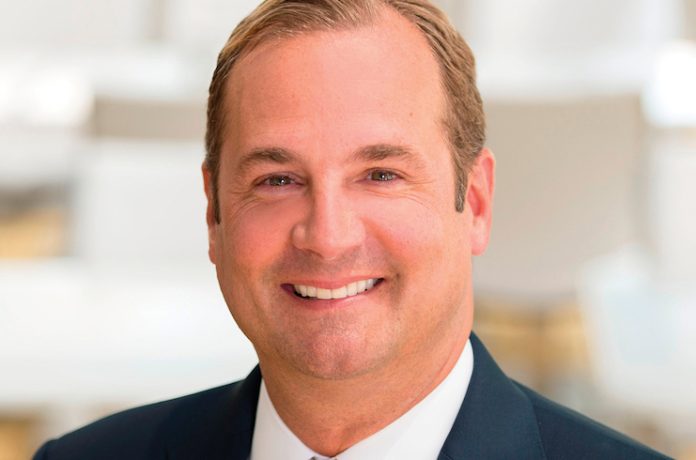Marriott International continues to grow its brand portfolio and expand its reach through new initiatives, such as the recent launch of a new extended-stay flag and a newly forged licensing deal with MGM Resorts. Marriott President/CEO Anthony Capuano recently sat down with LODGING to discuss some of those developments, as well as key issues impacting the lodging industry as a whole. The Q&A below represents a portion of that conversation.
In June, Marriott unveiled its new extended-stay brand targeting the lower-midscale segment. What was behind this launch?
There’s more and more demand in the midscale price point for an extended-stay product. Going all the way back to our acquisition of Residence Inn back in the ’80s, we have deep experience and understanding of that extended-stay segment. We got really excited about the prospect of developing organically a new-build product in the mid-price segment, but focused on that extended-stay customer. We’ve developed a product that we think really makes sense from an investment return perspective for our franchisee community and that we think is at a development cost that we can get financed even in today’s environment where the debt markets are relatively constricted. We also think that from a product perspective this will really resonate with that consumer that’s looking for an extended-stay product but in the midscale segment.
The company recently revealed the StudioRes name for the brand. How did it arrive at that?
We thought “Studio” was a really important part of the name because I think it evokes the right signal to the customer in terms of what their expectation should be as far as the product. We also loved “Res” because it really is a residential environment and that’s what many of these consumers are seeking.
The company recently signed a long-term licensing agreement with MGM Resorts International to create MGM Collection with Marriott Bonvoy. Can you elaborate on some of the potential benefits for Bonvoy members?
The value and the opportunities that it unlocks for our 186 million Bonvoy members are among the things we’re most excited about. Obviously, it adds 40,000 terrific new rooms to the portfolio, but when you think about the access to not only 17 extraordinary resorts—but the access to sports, entertainment, and culinary that MGM has—we think our Bonvoy members are going to love it. In addition, we sell multiyear group [business], and with increasing frequency Las Vegas is part of that group rotation. As a result of this transaction, in that mile-and-a-half strip MGM offers nearly five million sq. ft. of state-of-the-art meeting space on top of all the wonderful amenities. So I think both our transient and our group customers are going to be really excited about what this transaction will offer them.
From an industry perspective, labor continues to be a major challenge. In your opinion, is immigration reform a potential solution?
I think simultaneously as industry leaders we’ve got to be pragmatic about the reality of getting wholesale immigration reform, particularly when you’ve got such a divided government. But that doesn’t mean we should ease up on the accelerator in terms of helping government leaders understand the importance—particularly for the travel industry—of what immigration reform can do for our industry, and in turn the economic impact that the travel industry has on the broader landscape here in the U.S.
There are things we can do short of wholesale immigration reform that we should continue to push on, whether that is more temporary work visas or removing friction from the ability of inbound international visitors to get visas. We can encourage the U.S. government to lean more heavily on technology to streamline the visa process. Anything we can do to remove friction, whether that is to increase the number of temporary workers that are coming in to support our industry or whether it is to make it easier for international inbound visitors to visit the U.S., those are areas we should focus as much of our energy as we can.
Do you think legislators have been generally receptive to that message from the lodging industry?
I think it’s incumbent on the industry to continue to educate when we get in front of legislators and remind them of the importance that the travel and tourism sector represents as part of the broader economy. I think you find many receptive members of Congress. So again, it’s our responsibility to continue to educate them on areas where they can help drive improvement in the tourism sector and what the ripple effect of that will be on the broader U.S. economy.
Taking a look ahead, what’s your outlook on the lodging industry overall?
I continue to be extraordinarily optimistic about not only the back half of ’23, but into the future. I think while the pandemic was extraordinarily difficult on not only our company, but our industry, it was a powerful reminder to the traveling public how much they love to travel, and you’ve seen it in the travel trends and the speed with which demand has recovered. I think some of the trends that have emerged out of that recovery [are] blended trip purpose, the strength of leisure demand, and a reminder of the value of in-person meetings. All of those trends I think bode really, really well for the future of travel and for the future of performance at Marriott. So we continue to be quite optimistic, both qualitatively and in terms of the way we improved our guidance for the back half of 2023 and for full-year performance. I think that improvement in guidance reflects our optimism about the future of the business.











